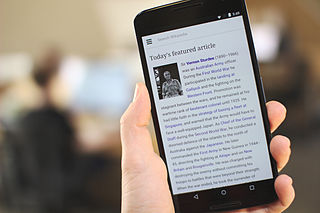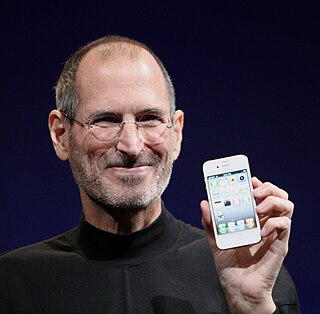
Nokia Corporation is a Finnish multinational telecommunications, information technology, and consumer electronics corporation, originally established as a pulp mill in 1865. Nokia's main headquarters are in Espoo, Finland, in the Helsinki metropolitan area, but the company's actual roots are in the Tampere region of Pirkanmaa. In 2020, Nokia employed approximately 92,000 people across over 100 countries, did business in more than 130 countries, and reported annual revenues of around €23 billion. Nokia is a public limited company listed on the Nasdaq Helsinki and New York Stock Exchange. It was the world's 415th-largest company measured by 2016 revenues, according to the Fortune Global 500, having peaked at 85th place in 2009. It is a component of the Euro Stoxx 50 stock market index.

A smartphone, often simply called a phone, is a mobile device that combines the functionality of a traditional mobile phone with advanced computing capabilities. It typically has a touchscreen interface, allowing users to access a wide range of applications and services, such as web browsing, email, and social media, as well as multimedia playback and streaming. Smartphones have built-in cameras, GPS navigation, and support for various communication methods, including voice calls, text messaging, and internet-based messaging apps.

HTC Corporation, or High Tech Computer Corporation, is a Taiwanese consumer electronics corporation headquartered in Taoyuan District, Taoyuan, Taiwan. Founded in 1997, HTC began as an original design manufacturer and original equipment manufacturer that designed and manufactured laptop computers.

Motorola Mobility LLC, marketing as Motorola, is an American consumer electronics manufacturer primarily producing smartphones and other mobile devices running Android. Headquartered at Merchandise Mart in Chicago, Illinois, it is a wholly owned subsidiary of the Chinese technology company Lenovo.
iPhone is a line of smartphones by Apple Inc.

Some mobile phones support use of two SIM cards, described as dual SIM operation. When a second SIM card is installed, the phone may allow users to switch between two separate mobile network services manually, have hardware support for keeping both connections in a "standby" state for automatic switching, or have two transceivers to maintain both network connections at once.

The SGH-F700, marketed as the Ultra Smart F700, is a smartphone manufactured by Samsung. Using Vodafone as its network provider, the phone was first introduced at the 3GSM World Congress that was held in February 2007. Sales to the European market started November 2007.

The history of the iPhone by Apple Inc. spans from the early 2000s to about 2010. The first iPhone was unveiled at Macworld 2007 and released later that year. By the end of 2009, iPhone models had been released in all major markets.
A mobile operating system is an operating system used for smartphones, tablets, smartwatches, smartglasses, or other non-laptop personal mobile computing devices. While computers such as typical/mobile laptops are "mobile", the operating systems used on them are usually not considered mobile, as they were originally designed for desktop computers that historically did not have or need specific mobile features. This "fine line" distinguishing mobile and other forms has become blurred in recent years, due to the fact that newer devices have become smaller and more mobile, unlike the hardware of the past. Key notabilities blurring this line are the introduction of tablet computers, light laptops, and the hybridization of the two in 2-in-1 PCs.
Playtronic Industrial Ltda. is a Brazilian video game company. Its original iteration was also a toy manufacturer and was based in Manaus, Brazil, and was a joint venture between companies Gradiente Industrial S.A. and Manufatura de Brinquedos Estrela S.A.. The company was founded on March 15, 1993, by the CEOs Eugênio Staub, from Estrela, and Mario Adler, from Gradiente. The initial business was assembling Nintendo products outside Japan for the Brazilian market, competing directly with Tec Toy, the Sega representative in the country. Since 2016, Playtronic has been developing games for Android and Xbox.
An app store, also called an app marketplace or app catalog, is a type of digital distribution platform for computer software called applications, often in a mobile context. Apps provide a specific set of functions which, by definition, do not include the running of the computer itself. Complex software designed for use on a personal computer, for example, may have a related app designed for use on a mobile device. Today apps are normally designed to run on a specific operating system—such as the contemporary iOS, macOS, Windows, Linux or Android—but in the past mobile carriers had their own portals for apps and related media content.

Lenovo smartphones are marketed as the "LePhone" in mainland China and the "IdeaPhone" overseas are smartphones designed and manufactured by the Motorola Mobility, ZUK Mobile and Medion, divisions of Lenovo. On April 27, 2017, Lenovo announced that the ZUK brand would cease operations. In 2015, Lenovo subsumed its own smartphone division into the acquired Motorola brand.
The smartphone wars or smartphone patents licensing and litigation refers to commercial struggles among smartphone manufacturers including Sony Mobile, Google, Apple Inc., Samsung, Microsoft, Nokia, Motorola, Huawei, LG Electronics, ZTE and HTC, by patent litigation and other means. The conflict is part of the wider "patent wars" between technology and software corporations.

Microsoft Lumia is a discontinued line of mobile devices that was originally designed and marketed by Nokia and later by Microsoft Mobile. Introduced in November 2011, the line was the result of a long-term partnership between Nokia and Microsoft—as such, Lumia smartphones run on Microsoft software, the Windows Phone operating system; and later the newer Windows 10 Mobile. The Lumia name is derived from the partitive plural form of the Finnish word lumi, meaning "snow".

Nokia PureView is the branding of a combination of technologies used in cameras of Nokia-branded smartphones and previously, in phones by Microsoft Mobile. PureView was first introduced with the Nokia 808 PureView.

The Samsung Galaxy Star is a low-end smartphone manufactured by Samsung Electronics. It was announced in April 2013, it was subsequently released in May 2013. It is the cheapest smartphone in the Samsung Galaxy series. Like all other Samsung Galaxy smartphones, the Galaxy Star runs on the Android mobile operating system. The phone is available in 2 versions: a single SIM version (GT-S5280) and a dual SIM version (GT-S5282). The phone competes with other low-cost smartphones such as the smartphones from the Nokia Asha series as well as low-cost smartphones manufactured by Indian manufacturers such as Micromax, Karbonn, Spice Digital, Lava International and Celkon. It is available in certain Asian countries such as India, Pakistan, Sri Lanka, Nepal, Bangladesh, Myanmar, Philippines, Indonesia etc. where low-cost smartphones are very popular as well as in Morocco, Algeria, South Africa, Portugal, France, Germany, Russia and Ukraine.

Microsoft Mobile Oy was a Finland subsidiary of Microsoft Devices involved in the development and manufacturing of mobile phones. Based in Keilaniemi, Espoo, it was established in 2014 following the acquisition of Nokia's Devices and Services division by Microsoft in a deal valued at €5.4 billion, which was completed in April 2014. Nokia's then-CEO, Stephen Elop, joined Microsoft as president of its Devices division following the acquisition, and the acquisition was part of Steve Ballmer's strategy to turn Microsoft into a "devices and services" company. Under a 10-year licensing agreement, Microsoft Mobile held rights to sell feature phones running the S30/S30+ platform under the Nokia brand.
Kuzu Mobile is a consumer electronics company headquartered in Hong Kong. It is founded by a Bhutanese Entrepreneur Ugyen Rangdol Kuzu Mobile sells engineered and Chinese contract manufactured Mobile Telephones, Tablet Computers, 3G Datacards and LED Televisions.
Nokia is a Finnish multinational corporation founded on 12 May 1865 as a single paper mill operation. Through the 19th century the company expanded, branching into several different products. In 1967, the Nokia corporation was formed. In the late 20th century, the company took advantage of the increasing popularity of computer and mobile phones. However, increased competition and other market forces caused changes in Nokia's business arrangements. In 2014, Nokia's mobile phone business was sold to Microsoft.

Human Mobile Devices (HMD), formally HMD Global, is a Finnish independent mobile phone manufacturer. The company is owned by the Luxembourgish holding company Smart Connect GL. The company is made up of the mobile phone business that the Nokia Corporation sold to Microsoft in 2014, then bought back in 2016. HMD began marketing Nokia-branded smartphones and feature phones on 1 December 2016. The company has exclusive rights to the Nokia brand for mobile phones through a licensing agreement. The HMD brand was initially only used for corporate purposes and does not appear in advertising, whereas the name "Nokia Mobile" is used on social media. In January 2024, HMD rebranded to 'Human Mobile Devices' and will use its branding on future devices alongside that of Nokia.













